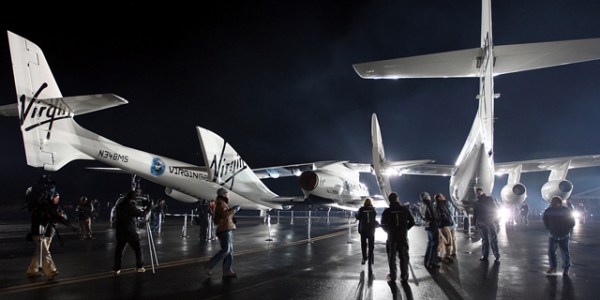Want to fly anywhere on Earth in less than two hours?
Today, Virgin Galactic is scheduled to unveil SpaceShipTwo in California's Mojave Desert, the first spacecraft for private passenger travel.
With several firms working on commercial suborbital spaceships, a two-hour flight to anywhere on Earth may soon be possible, says an advocacy group laying the groundwork for global high-speed air and space travel.
"If you look at the history of this, it's nothing but a graveyard," said John Olds, the founder and chief executive of SpaceWorks Engineering, who is leading a study group on suborbital point-to-point travel.
There was the National Aerospace Plane, a project by the U.S. Defense Advanced Research Projects Agency to create a single-stage reusable spacecraft that could travel 25 times faster than the speed of sound. President Ronald Reagan announced the project in his 1986 State of the Union address, bragging that it would be able to travel from Washington, D.C., to Tokyo in two hours.
The so-called "Orient Express" was canceled before the first vessel was ever built.
Reagan's National Aerospace Plane was followed by NASA's VentureStar and a host of prototype vehicles to test ramjets, scramjets, composites and other new technologies. Meanwhile, whether a market for high-speed global transport would materialize remained a mystery.
Slideshow 11 photos
The making of SpaceShipTwo
"If you ask a group of people if there's a market for this, they say, 'Oh, the answer is obvious,'" Olds told Discovery News. "Half say, 'Of course there's a market.' The other half says 'Of course not.'"
Olds' study group, called FastForward, sees the rise of commercial suborbital spaceflight as a natural starting point for pioneering point-to-point global space travel.
Several firms, including Richard Branson's Virgin Group, Amazon founder Jeff Bezos' Blue Origins, XCOR Aerospace, Armadillo Aerospace and others are developing suborbital vessels for flying tourists, scientists and other passengers.
For now, they are focused on building their spaceships and recruiting passengers and payloads.
"We're very excited about the research applications," said Alan Stern, a former NASA associate administrator who is now working with universities and science organizations to fly experiments on private suborbital spaceships.
Those ships will launch and land from the same place, exposing participants and payloads to just a few minutes of microgravity.
Flying to another point on the planet would be a significant step up, technologically, Olds said. It also presents many legal and political issues, such as flying over countries that may not be friendly to the United States.
FastForward advocates an evolutionary approach to high-speed global transportation, rather than the great technological leaps attempted in the past. Building on the business of suborbital spaceflight also should help develop a sustainable market for point-to-point travel.
"I do think it's the logical evolution," Olds said.

